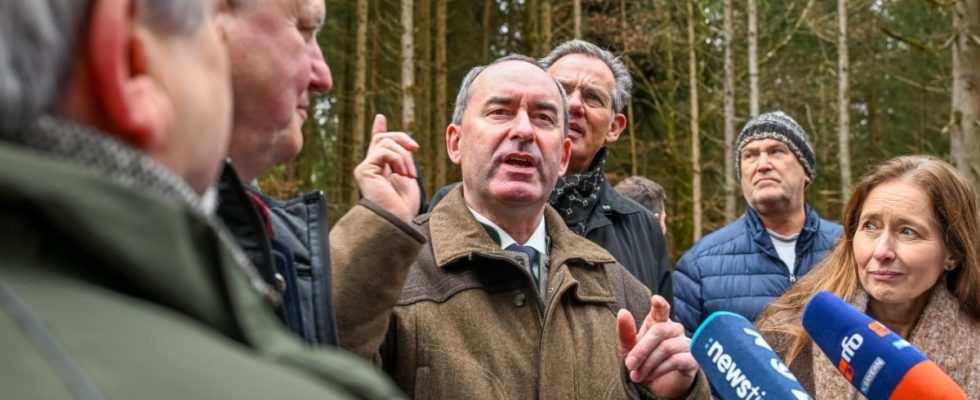It wasn’t even six weeks ago that Hubert Aiwanger looked down on Mehring from above. It wasn’t far up, because the Eschlberg, where Bavaria’s economics minister had called for Mehringer’s yes to the wind farm in the Altöttinger Forest, is only a small hill. At that time, the only people with him on the Eschlberg were local politicians, company representatives, foresters and journalists. But the citizens of Mehringen, most of whom had long since filled out and sent in their ballot papers, were to decide a week and a half later. In the end, two thirds said no to a wind farm in the state forest. A few weeks later, on this Monday, Aiwanger is downstairs with the residents in the Öd, the settlement on the edge of the forest where most of the Mehringers live.
The forest is less than a hundred meters away from the wooden garden fence where Aiwanger is talking to three married couples, away from the waiting journalists. One of the women asked him on the discussion show “Now Red I” on Bavarian television to just come and see them, but that too was after the referendum. They could only imagine wind turbines in the forest if they were at least two kilometers away from their houses, Aiwanger’s hosts said after the meeting. They don’t want to have anything to do with the citizens’ initiative “Gegenwind Altötting”, which sometimes shows little fear of contact with the extreme right and the lateral thinker scene.
The initiative has called on its members throughout the region to come to Mehring in large numbers. Some wind farm supporters tended to think of these critics as Aiwanger’s clientele, but they could hardly have expected the usual applause from them. There is actually no applause, but the minister in Mehring doesn’t face too much headwind despite the BI’s call. Mayor Robert Buchner, like Aiwanger a free voter, is relaxed on the sidelines anyway. For him, the wind farm issue is over for the foreseeable future. Is Aiwanger’s conversation with the residents now the appearance that was needed before the referendum? “It would have been needed a few months ago,” says Buchner.
Bavaria’s Minister of Economic Affairs interprets the result of the decision “as a request to talk more to the citizens about the wind farm.” After all, it was not just the desire of the energy-hungry industry in the Bavarian chemical triangle to generate at least a small part of the urgently needed climate-neutral electricity in the region. It was also the state government’s declared intention to build the largest wind farm to date in Bavaria with a total of 40 wind turbines in the state-owned Altöttinger Forest.
But the state forests have long ago made any wind power projects in their forests dependent on the consent of the respective community. With Mehringer’s no, there is now a lack of space for ten of the 40 systems. Aiwanger tries to find a positive side to the rejection. “It may be that if the people of Mehring had not voted against it, we would not be meeting in this form today,” he says a little later and a few kilometers further in the packed community hall of the municipality of Marktl am Inn. In Marktl, too, the “Headwind” initiative collected enough signatures for a referendum without much effort, but unlike in Mehring, the local councilors rejected such a decision as inadmissible. The demand that the 3,000-resident community use all legally possible means against the wind farm plans seemed too vague to them. Instead, the councilors want to formulate a council request with the BI this Tuesday, which the marketers should vote on in the European elections in June.
According to current plans, here in Marktl there are only three systems. But here, too, there are concerns from residents directly on the edge of the forest to people who say they live nine kilometers away but are worried about the noise from the rotors. Aiwanger replies that the facilities in the forest are not only visible to walkers later than in the open area, but can also hardly be heard. When there is no wind, the rotors do not turn, and when the wind blows, the blades rustle louder than a wind turbine, for which Aiwanger could also imagine a minimum distance of 1,500 meters to the next settlement instead of 1,000 meters as a compromise.
After the Mehringer decision, Aiwanger responded to criticism from the CSU about his lack of commitment by saying that he would not be sent wherever he was wanted. In Marktl he now strikes a different tone. If he were to go everywhere where a wind turbine was planned, “then I’ll be a wind turbine field representative for the next few years. But I’m happy to come because I’ll meet sensible people there.”

